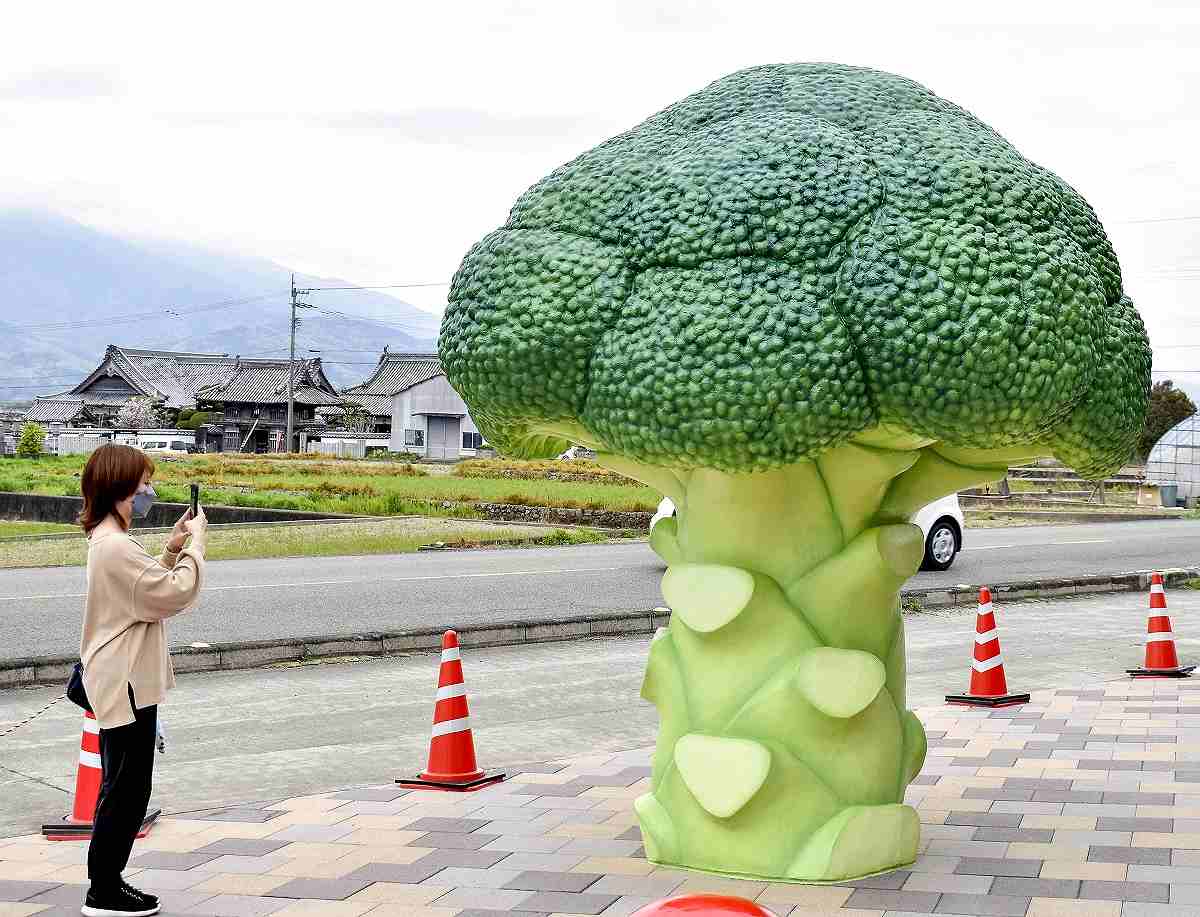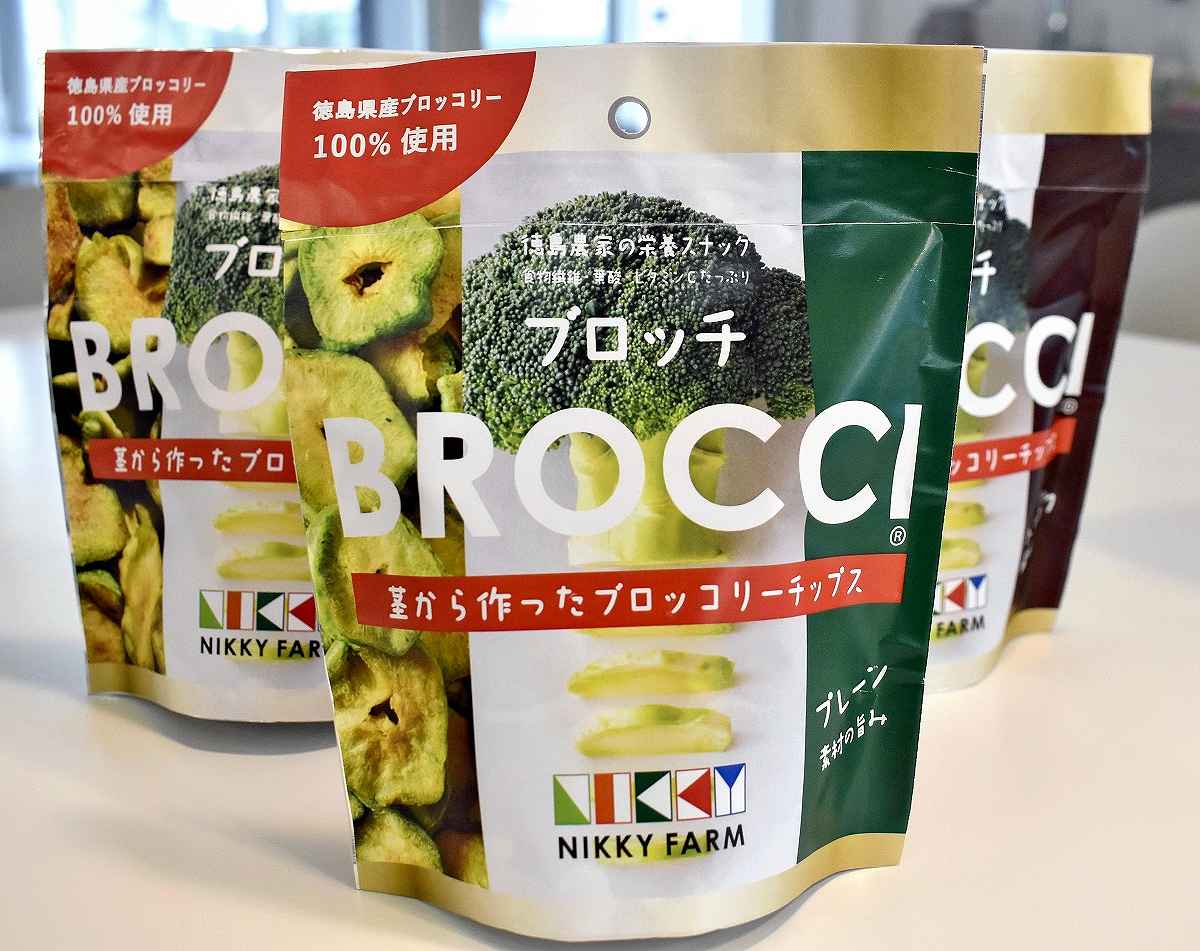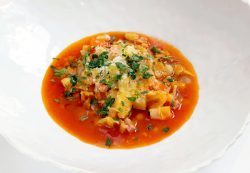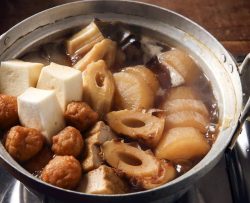
Hayato Ishihara, left, cultivates broccoli in Awa, Tokushima Prefecture.
12:00 JST, June 16, 2024
TOKUSHIMA — More and more broccoli is coming out of Tokushima Prefecture, with 10,900 tons shipped in 2022. That’s the fifth largest volume for a prefecture and seven times more than in 1989, the earliest year for such records.
Broccoli is set to be listed in fiscal 2026 as one of the Agriculture, Forestry and Fisheries Ministry’s “designated vegetables,” or those vegetables consumed in mass quantities and important for daily life. In anticipation, local producers are working to expand production and create new products.
Rich in beta-carotene, broccoli is highly nutritious, and 157,100 tons of the vegetable were shipped nationwide in 2022. While other major vegetables have seen their harvest sizes fall or stay level over the past 30 years, production of broccoli has doubled.
In January, the agriculture ministry indicated it would add broccoli to its list of 14 designated vegetables, which includes cabbages and daikon radishes. Broccoli will be the first addition in 50 years, and the first since the potato. The ministry provides substantial subsidies to producers of designated vegetables if there is a price slump and helps to ensure a stable supply.
“[Broccoli’s] growing popularity is due to various factors, including its attractive coloring, its lack of offensive tastes and odors, and its ease of consumption,” the ministry said.
The shipment volume and cultivation area for broccoli in Tokushima Prefecture have risen every year since 1989. That year, only 1,513 tons were shipped and there were 185 hectares under cultivation, while there are now 974 hectares set aside for broccoli. Local producers have been racking their brains for ways to make the most of the demand tailwind.
For about 20 years, a former agricultural cooperative in Awa, Tokushima Prefecture, now a part of the prefecture’s cooperative, has been taking advantage of the ease with which broccoli can be grown compared to other leafy vegetables and the ease with which beginners can grow it, and rented out farm machinery.
As a result, new farmers have gotten involved, and producers of the vegetable doubled from 155 in 2008 to 320 in 2018, with shipment volume rising by around 300%.
Broccoli has become the highest selling product in the area, and the area has seen some of the prefecture’s strongest sales growth.
Hayato Ishihara, a 32-year-old former employee of a welfare facility, started farming in 2021 and is now growing six kinds of vegetables, including eggplants. He is also trying his hand at broccoli and shipped 1.2 tons of it for the first time this year.
“It was easy to cultivate because there was little damage by pests. I want to improve my skills further and boost productivity,” Ishihara said.
To tout the area’s broccoli production, a branch of the cooperative created a 3-meter-tall statue of the broccoli with a 3D printer. It then installed the statue in front of its building, which opened in March.

A broccoli statue that has been installed in front of an agricultural cooperative branch in Awa, Tokushima Prefecture
“With an eye to joint shipments, we are working with the Itano district and surrounding areas,” a representative for the branch said. “We hope to create a [favorable] environment and work more on promotion.”
Nikky Farm in Tokushima City has expanded broccoli plantings to cover 35 hectares, up from 5 hectares in 2016. It ships broccoli mainly to the Kansai region.
“I feel that Tokushima is famous for broccoli in Kansai because we hold the top market share there,” said company President Mitsutoshi Niki, 39.
Aiming to reduce food loss, the company has created Brocci, a snack made from broccoli stalks, which are often thrown out during processing. The snack is set to go on sale at Kansai supermarkets in July.
“I think the stalks are too delicious to waste,” said Niki. “I hope to come up with a lot of different ways to bring them to market.”

Snacks made from broccoli stalks
Top Articles in Features
-

Tokyo’s New Record-Breaking Fountain Named ‘Tokyo Aqua Symphony’
-

Sapporo Snow Festival Opens with 210 Snow and Ice Sculptures at 3 Venues in Hokkaido, Features Huge Dogu
-

Tourists Flock to Ice Dome Lodge at Resort in Hokkaido, Japan; Facility Invites Visitors to Sleep on Beds Made of Ice
-

High-Hydration Bread on the Rise, Seeing Increase in Specialty Shops, Recipe Searches
-

Heirs to Kyoto Talent: Craftsman Works to Keep Tradition of ‘Kinran’ Brocade Alive Through Initiatives, New Creations
JN ACCESS RANKING
-

Japan PM Takaichi’s Cabinet Resigns en Masse
-

Japan Institute to Use Domestic Commercial Optical Lattice Clock to Set Japan Standard Time
-

Israeli Ambassador to Japan Speaks about Japan’s Role in the Reconstruction of Gaza
-

Man Infected with Measles Reportedly Dined at Restaurant in Tokyo Station
-

Videos Plagiarized, Reposted with False Subtitles Claiming ‘Ryukyu Belongs to China’; Anti-China False Information Also Posted in Japan






















